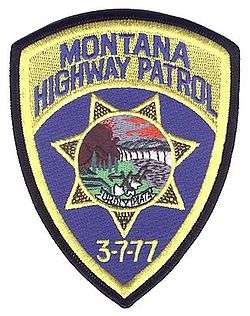3-7-77

3-7-77 was the symbol used by the Montana Vigilantes (Vigilance Committee) in Virginia City, Montana. People who found the numbers '3-7-77' painted on their tent or cabin knew that they had better leave the area or expect to be on the receiving end of vigilantism. The numbers are used on the shoulder patch of the Montana Highway Patrol, who claim they do not know the original meaning of the symbol, though the Association of Montana Troopers web site says "Regardless of its meaning, however, 3-7-77 is emblematic of the first organized law enforcement in Montana. The Montana Highway Patrol, in adopting this early symbol, honors the first men in the Montana Territory who organized for the safety and welfare of the people. For that same reason, the Association of Montana Troopers has carried on that tradition by placing the legendary 3-7-77 on their patch as well."[1]
The symbol also appears on the flight suits of pilots of the Montana Air National Guard, and the Flight Patch of the Montana Army National Guard Medevac unit (C Co 1-189th GSAB - Vigilantes). Further, it appears under the bottle cap of certain varieties of Big Sky Brewing Company beer.[2]
- The numbers represent the dimensions of a grave, 3 feet by 7 feet by 77 inches.[3]
- Frederick Allen, in his book A Decent Orderly Lynching, says the number meant the person had to buy a $3 ticket on the next 7:00 a.m. stagecoach to take the 77-mile trip from Helena to Butte.[4]
- The number set may have something to do with the date March 7, 1877; the numbers were first used in that decade and first appeared in print later in that decade of the 19th century
References
- ↑ "Association of Montana Troopers | 3-7-77 Information". www.montanatrooper.com. Retrieved 2016-07-08.
- ↑ Long, Nick. Personal interview. 13 Aug 2009. Interview.
- ↑ Maclean, Norman (1992). - A River Runs Through It and Other Stories. - New York, New York: Pocket Books (Simon & Schuster). - pp. 33. - ISBN 0-671-77697-5.
- ↑ Allen, Frederick. A Decent Orderly Lynching. Norman, Oklahoma: University of Oklahoma Press, 2004.